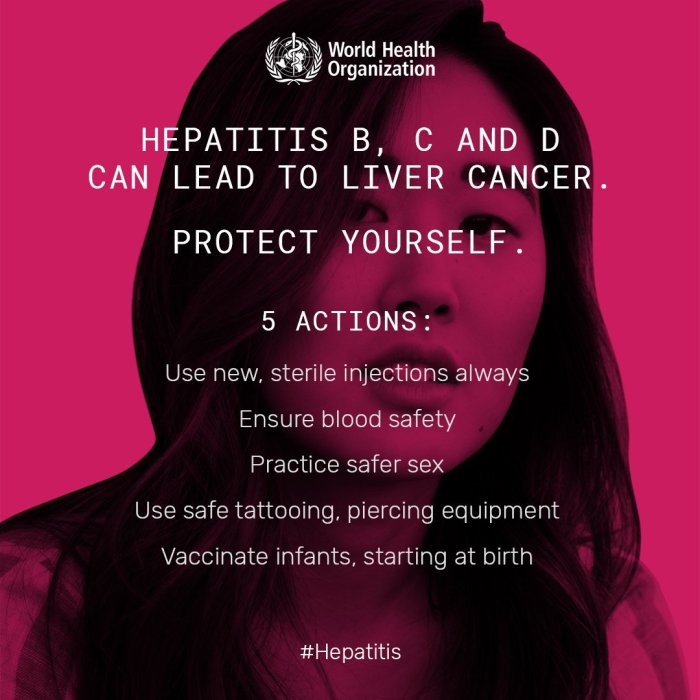Ada knows that she has liver cancer – Ada’s diagnosis of liver cancer marks a profound turning point in her life, triggering a cascade of emotions and complex medical decisions. This article delves into the psychological impact of this diagnosis, exploring Ada’s coping mechanisms and the support systems that sustain her.
It also provides a comprehensive overview of treatment options, their benefits, and potential risks, empowering Ada and her loved ones with knowledge and informed decision-making.
Medical Condition: Liver Cancer

Liver cancer is a malignant tumor that develops in the liver. It is the sixth leading cause of cancer death worldwide.
Causes and Risk Factors
- Chronic hepatitis B or C infection
- Alcohol abuse
- Nonalcoholic fatty liver disease (NAFLD)
- Diabetes
- Obesity
Symptoms and Signs
- Abdominal pain
- Jaundice (yellowing of the skin and eyes)
- Fatigue
- Nausea and vomiting
- Weight loss
Stages and Prognosis
- Stage 1:Tumor is confined to the liver.
- Stage 2:Tumor has spread to nearby lymph nodes.
- Stage 3:Tumor has spread to other parts of the liver or to other organs.
- Stage 4:Tumor has spread to distant organs.
The prognosis for liver cancer depends on the stage of the disease. The five-year survival rate for stage 1 liver cancer is 65%, while the five-year survival rate for stage 4 liver cancer is less than 5%.
Ada’s Emotional Response
A diagnosis of liver cancer can be devastating. Ada may experience a range of emotions, including:
- Shock and disbelief
- Anger and frustration
- Sadness and depression
- Fear and anxiety
Coping Mechanisms and Support Systems
Ada can cope with her diagnosis by:
- Talking to her doctor and other healthcare professionals about her condition
- Joining a support group for people with liver cancer
- Seeking counseling or therapy
- Spending time with loved ones
Role of Family and Friends
Ada’s family and friends can play an important role in supporting her during this time. They can:
- Provide emotional support
- Help with practical tasks, such as transportation to appointments or running errands
- Respect Ada’s wishes and decisions
Treatment Options: Ada Knows That She Has Liver Cancer
The treatment options for liver cancer depend on the stage of the disease. Treatment options include:
- Surgery:Surgery is the most common treatment for liver cancer. It can be used to remove the tumor or to reduce its size.
- Radiation therapy:Radiation therapy uses high-energy beams to kill cancer cells. It can be used to treat liver cancer that is too large to be removed surgically or that has spread to other parts of the body.
- Chemotherapy:Chemotherapy uses drugs to kill cancer cells. It can be used to treat liver cancer that has spread to other parts of the body.
- Targeted therapy:Targeted therapy uses drugs that target specific molecules that are involved in the growth and spread of cancer cells. It can be used to treat liver cancer that has certain genetic mutations.
- Immunotherapy:Immunotherapy uses the body’s own immune system to fight cancer. It can be used to treat liver cancer that has certain genetic mutations.
Palliative Care
Palliative care is a type of medical care that focuses on improving the quality of life for people with serious illnesses. Palliative care can be provided at any stage of the disease, but it is often most helpful in the later stages.
Types of Palliative Care Services
- Pain management
- Symptom management
- Emotional support
- Spiritual support
Benefits of Palliative Care
Palliative care can help Ada and her family by:
- Relieving pain and other symptoms
- Improving Ada’s quality of life
- Providing emotional and spiritual support
- Helping Ada and her family cope with the challenges of her illness
Prognosis and End-of-Life Care

The prognosis for liver cancer depends on the stage of the disease. The five-year survival rate for stage 1 liver cancer is 65%, while the five-year survival rate for stage 4 liver cancer is less than 5%.
Importance of Advance Care Planning
It is important for Ada to make decisions about her end-of-life care in advance. This will help ensure that her wishes are respected and that she receives the care that she wants.
End-of-Life Care Options, Ada knows that she has liver cancer
- Hospice care
- Palliative care
- Home care
Essential FAQs
What are the common symptoms of liver cancer?
Fatigue, abdominal pain, loss of appetite, nausea, vomiting, jaundice, swelling in the abdomen and legs, and unexplained weight loss.
What are the different treatment options for liver cancer?
Surgery, ablation therapy, embolization, radiation therapy, chemotherapy, targeted therapy, and immunotherapy.
What is the role of palliative care in liver cancer?
To improve quality of life by managing symptoms, providing emotional support, and assisting with decision-making.